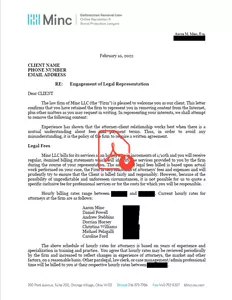
- Originally Published on March 23, 2022
What is a Retainer Fee Agreement & How Does It Work?
Finding and hiring an attorney can be a complex and confusing process, and the payment structure is no exception. If you are seeking legal representation for online defamation, internet-related privacy, or any other type of legal matter, one question may stand out from the rest: what is a retainer fee and how does it work?
A retainer fee is an advanced payment that a client provides upfront to secure the services and time of a professional (such as an attorney). The amount varies depending on the type and scope of work a client and professional agree upon. Once a client pays the retainer, that money is placed in a separate account—and the professional or company (such as a law firm) will then “bill against that amount” as they work on the contracted matter at hand.
At Minc Law, transparency is paramount to us. We strive to ease the overwhelming idea of costs in clients’ minds and want our clients to fully understand their engagement agreement and the terminology used before they execute their agreements. By helping clients understand what they are entering into in advance, we hope to foster a positive, effective, and beneficial client-attorney relationship from the start.
In this article, we explain how a retainer fee works and how it benefits all parties involved. We also give readers an idea of what all retainer fee agreements should contain, as well as the optional clauses that may be included. Finally, we explore a few resources for finding retainer fee agreement examples.
What is a Retainer Fee & How Does It Work?
A retainer fee is an advanced payment made by a client to secure the services of a professional or service. When hiring legal representation, this form of payment structure is one of the most common ways to pay an attorney.
Instead of paying for the entire service after all work has been completed, a client makes an initial payment towards the anticipated service to ensure commitment to the contract by both the client and the professional performing the services.
Typically, law firms require retainer fees to enable their attorneys to bill against the retainer as they work on the matter. The amount of money requested for a retainer fee is generally based on an attorney’s hourly rate times the expected amount of time it will take to complete their work on a matter.
How Do Retainer Fees Work?
In most cases, retainer fee payments are put directly into a separate trust account and are only deducted when work has been completed on the matter. The retainer contract fee is not used for any matters other than for the client who made the initial payment.
Professionals that use retainer fee agreements typically operate on an hourly rate, which is based on their level of expertise and experience in the field. For example, Minc Law attorneys’ hourly rates range from $250–$600 per hour.
As an attorney works on a client’s matter, they bill their hourly rate against the retainer fee in the trust account. That amount is then moved to an operating account. The attorney is not given access to the retainer fee until they complete work towards the matter for which it was paid.
For example, if an hourly matter takes an attorney ten hours to complete, and their average hourly rate is $350, the requested retainer may begin at $3,500. If the attorney takes less time to resolve the matter, the client will be refunded the remainder of the retainer.
Conversely, if the attorney needs additional time to complete work on a matter, the client will be billed at the attorney’s hourly rate once the retainer is depleted (runs out). Another option is to ask the client to pay an additional retainer.
Video: Attorney Retainer Fee Agreement: Your Questions Answered

Is a Retainer Fee the Same as a Deposit?
A retainer fee holds similarities to a deposit, but the two terms are not interchangeable. A deposit is a fee paid to reserve a date or a service, with the understanding that it is refundable. Think, for example, of a security deposit when entering into an apartment rental agreement. If there has been no significant damage when the renters move out, that deposit can be returned in full.
Or perhaps a bride and groom place a deposit to reserve their wedding venue. That deposit’s purpose is to hold the venue for their desired date; it is separate from the actual fee of the event cost. It will be refunded if everything goes as planned.
A retainer fee agreement, on the other hand, is a down payment of the costs of the services being purchased. A client who pays a retainer to an attorney does so with the understanding that they are purchasing that attorney’s services. Retainer fees cover at least the initial costs of the services to be rendered.
Unlike a deposit, a retainer is not expected to be refunded at the end of the contract. The notable exception would be if the cost of the work ends up being less than the retainer; then, the remaining balance may be refunded.
Minc Law Legal Tip: Legal terminology can be overwhelming and confusing for many new clients. To make things easier, we have compiled a comprehensive guide to understanding basic legal terms you might encounter during your legal engagement.
Why Do People Draft Retainer Agreements, & How Successful Are They?
Professionals use retainer agreements to allot time towards a specific matter. In some ways, paying a retainer fee is like reserving a space for an attorney’s attention and expertise (and subsequently compensating for their work performed).
A retainer fee is generally based on the expected base cost of a service. That way, the attorney is sufficiently able to start working on a case with a base amount of funds allotted to the matter.
A retainer also sets out the exact duties of the lawyer and client so that all parties to the agreement have clear expectations regarding services rendered.
And finally, retainer fee agreements enable both the professional and the client to establish the fees and costs that the client will be responsible for within the matter’s proceeding.
Where Are Retainer Fees Most Commonly Used?
Retainer fees are used by a wide variety of professionals, including consultants, business developers, freelancers, accountants, and attorneys. All of these professions most typically rely on retainer fees because they are service-based professionals that often juggle multiple clients at the same time. Their client work may also take several days or weeks to complete, sometimes with an unpredictable project scope.
In the legal field, retainer fee agreements are most often used for matters such as:
- Criminal and civil cases,
- Divorce and family law,
- Personal injury,
- Medical malpractice, and
- Probate.
A retainer can help professionals generate cash flow stability by getting paid in bulk upfront, then accessing those funds steadily as they apply hours towards their clients’ cases.
Typically, professionals that use retainer fee agreements bill their work from a base hourly rate. The retainer fee agreement allows the professional to set aside an allotted amount of time towards a matter and have a specific fund to bill their time towards for the matter.
When a professional’s work is client-centered, retainer fees allow providers to toggle between many different clients and distinguish their billing for each.
Benefits of Having a Retainer Fee Agreement
A retainer fee agreement incorporates predictability within the course of representation and services rendered. By clearly establishing the work to be done by the professional for the client during the allotted time (and how much that work will cost), retainer fee agreements empower the following benefits:
- Professionals have a predictable cash flow for the services they provide;
- Clients have guaranteed access to the services and expertise of the professional during the agreement period; and
- Clients can budget for their particular matter in advance.
Below, we discuss in greater detail the benefits and limitations of a retainer fee agreement.
Who Benefits Most From Utilizing a Retainer Agreement?
All parties to a professional engagement can benefit equally from utilizing a retainer agreement.
Attorneys benefit from using retainer fees because they provide a predictable amount of cash at their disposal for a particular matter. The attorney and/or law firm can then work diligently and thoughtfully towards a matter without worrying about what costs may be associated with future components of the case. They also do not need to deal with the inefficient process of charging and waiting for fees to be processed.
Retainer fee structures benefit professionals by generating stable, long-term, and improved client relationships. Rather than a series of one-off contracts, a fixed retainer fee system allows professionals to put the time they would otherwise spend on looking for new work towards consistently working on their current clients’ needs.
But retainer agreements do not only benefit the professional who provides services.
Mutual Benefits Between the Client & Professional
There are several ways in which both the professional and the client benefit from a retainer fee agreement. Retainer fees allow for transparency and accountability between the client and the professional. These types of agreements clearly establish the cost of services and the expectations of those services.
Retainer agreements ensure that the client and professional have a clear understanding of what to expect from each other.
Also, professionals and their clients both benefit from having a retainer fee in place because it can prevent future miscommunication and/or disputes. The retainer agreement is a legally binding document, safeguarding the rights and responsibilities of both sides.
By clearly defining services and costs up-front, potential disputes over the contractual agreement can be largely mitigated.
What Sort of Benefits Can the Client Receive From a Retainer Agreement?
Clients benefit from retainer fee agreements because they provide confidence and predictability regarding how their money is being used and where it is being allocated.
The funds are placed in a separate account, such as a trust or IOLTA account, to ensure the payment is being used appropriately (IOLTA stands for Interest on Lawyer Trust Account). The professional then bills their time against the trust, extracting the amount owed based on the time worked. This process is then detailed in monthly invoices to the client to show what services were completed for their case and how those services were billed against the retainer.
Additionally, when a retainer fee is submitted upfront, this type of agreement allows the client to budget effectively and have a clear understanding of the overall cost for their matter.
A retainer fee is typically refundable if all of the money is not used. For example, if an attorney estimated that the matter would cost $5,000 but your goal was accomplished for $3,000, the remaining $2,000 from your retainer can be refunded back to you.
Finally, a retainer fee can create an ongoing relationship between the attorney and the client. Legal matters can crop up without warning and often need to be handled quickly and discreetly. Having an attorney on retainer has several legal benefits, including:
- Being certain of your legal representation,
- Having a law firm that is already familiar with you and your business, and
- Preventing your competitor from hiring them.
Retainers provide the security and peace of mind of having an expert on standby for when an unanticipated matter arises.
What Are the Limitations of a Retainer Agreement?
One core limitation of a retainer fee agreement is that there is no guaranteed outcome of the service provided. Most legal professionals cannot guarantee success since there are a variety of factors that could derail a matter.
However, regardless of the outcome, attorneys must be able to bill their time for their work and their expertise. So when a retainer fee agreement is used, you will bear the cost but may not always have a successful outcome.
Retainer fee agreements are based on the idea that there is an expected amount of work to be done towards a matter and an expected cost associated with the case. However, retainer fees are not typically a suitable structure and fit for a one-time, short-term service.
What Should Be Included in a Retainer Fee Agreement?
Every legal matter is unique, which means that no two retainer fee agreements should be identical. But the best retainer agreements do contain the same core components.
Below, we discuss the essentials that every retainer agreement should include, as well as a few optional components that may be included.
What Are the Core Components That Should Be Included in Any Retainer Fee Agreement?
If you consent to pay a retainer fee to an attorney, you will most likely be asked to sign a retainer fee agreement. All retainer fee agreements should include the following core components:
- Description: A description of the legal fees and invoicing process to inform the client what they will be billed for, the rate at which they will be billed, and how often to expect an update on their invoice;
- Expectations: An outline of expectations for what happens when the retainer and/or legal fees are exhausted;
- Scope of Work: The scope of work the professional is expected to complete within the retainer agreement; and
- Additional Expenses: How to handle expenses incurred that fall outside of typical attorney or paralegal work.
What Are Some Optional Components That Should Be Included in a Retainer Fee?
Beyond its core components, a retainer fee agreement can—and should—also be customized to fit each unique client-attorney relationship. Both the law firm and client have the option to include clauses such as the ones listed below to clarify expectations going forward.
Guaranteed vs. Not Guaranteed Service
Some retainer fee agreements include guaranteed services and non-guaranteed services. The types of service provided will determine the expectation of payment. For guaranteed service, the fee is paid upfront—but if the service is not completed, the fee is refunded to the client.
Conversely, if the agreement is for a non-guaranteed service, the attorney keeps the retainer regardless of the case’s outcome.
Opt-In Services
Some retainer fee agreements will include optional services to which clients may opt-in for an additional fee. At Minc Law, we offer a Digital Risk Protection service that monitors an individual’s online profile and alerts them to problematic content.
This service comes at an additional cost, but clients can opt-in to the service through their engagement agreement.
Minc Law Digital Risk Protection Tip: Much like having an attorney on retainer, it can be helpful to be proactive about guarding and maintaining your online footprint. Digital Risk Protection is the act of using a variety of tools, technology, and techniques to track threats against your digital reputation before they become a problem.
Evergreen vs. Non-Evergreen Retainer
Some retainer agreements require different types of payments. In an evergreen retainer, the client pays the retainer down-payment and then replenishes the retainer each month based on the amount of work completed. This type of retainer functions as a safety net of sorts, because the retainer itself is never depleted. At the end of the matter—if the client has been making payments each month—the client will receive the down payment back.
A non-evergreen retainer is billed against by the professional until funds are exhausted, with no additional payments made until that time. Once the original retainer is exhausted, the client is then billed above the retainer amount at the hourly rate of their attorney (article: What is the Likelihood that My Retainer Will Be Exhausted?)
Arbitration & Mediation
In the event of a dispute, these clauses can provide guidance on how disagreements should be handled. In arbitration, a private judge (or another third party) hears both sides of the dispute and decides how to resolve the issue.
In mediation, the disputing parties are in control of how the dispute is resolved, but they use a neutral third party to facilitate productive conversation.
Interest Accrual Rates
The attorney may charge interest on late fees. If they decide to do so, this clause specifies how interest will be charged (for example, 10% simple interest beginning 60 days after the billing invoice is issued).
Insurance
If an insurance company is paying for a portion or all of the client’s legal fees, the attorney should include this clause. The clause explains how the fees will be paid, and what happens if the insurance company does not cover all of the fees.
How Should You Go About Tailoring Your Retainer Fee to Your Specific Situation & Needs?
When discussing the retainer fee agreement with your attorney, we recommend covering the following points:
- Your budget and any price concerns you have,
- Your preferred timeline for accomplishing your goals,
- Services you do not need or want,
- Important confidentiality considerations (who can the attorney speak to about your case?), and
- Which settlements or actions you approve of.
Another consideration to make when crafting a retainer fee agreement is the type of matter the client is pursuing. Litigation matters (i.e., lawsuits) usually have longer-time horizons, more personnel working on the matter, and more administrative fees. Thus, litigation matters are usually more costly—so it makes sense to request a higher retainer at the beginning.
Alternatively, non-litigation matters (i.e., solving legal problems outside the courtroom) are often less complex. In many cases, non-litigation matters are confined to either one or two attorneys and require less time and less work to complete. In that case, the retainer agreement may require a smaller down-payment.
Can a Retainer Fee Be Refunded?
As mentioned above, a retainer is different from a deposit precisely because it is not meant to be refunded. In a perfect world, clients would see a refund if they do not obtain their desired outcome. But attorneys must do the same amount of work in either case, and that work should be paid.
However, portions of retainer fees may be refunded if services cost less than originally planned.
In most cases, if the full retainer has not been spent, the remaining funds will be refunded to you at the end of your matter. If you are unsure of your attorney’s refund policy, check your retainer fee agreement for specific language regarding refunds.
Example of a Retainer Fee Agreement
It is one thing to understand the theory of a retainer fee, but it is another to see such an agreement in practice.
Below, we explain several ways to find retainer fee agreement examples and templates. We also explain the agreement template we use at Minc Law.
Where Can You Find Examples of Retainer Fee Agreements?
Fortunately, in today’s digital age it is quite easy to find numerous retainer fee templates and examples. You can access a wide variety of examples in places like:
- Google and other search engines,
- Free legal template software,
- Law firm websites and resource centers, and
- Consulting firms resource centers.
Minc Law Retainer Fee Agreement Example
At Minc Law, our retainer fee agreements are based on the type of matter a client is looking to pursue. We currently offer three types of retainer fee agreements:
Guaranteed Removals
For guaranteed removals, we charge a flat fee to remove unwanted content from a specific list of websites. If we are unsuccessful, your payment will be refunded to you.
Hourly (Litigation & Non-Litigation)
These cases do not involve a flat fee agreement. Instead, the final cost of representation is based on how much time it takes the attorney to accomplish your goal(s). The charges are deducted from your starting retainer until the balance is depleted, then the client is responsible for paying additional hourly charges.
Financing Engagement Agreements
This type of agreement is the same as either a guaranteed removal or an hourly agreement. The only difference is that the client has obtained third-party attorney retainer fee financing to pay for Minc Law’s legal services.
The example below is a standard hourly retainer agreement. Note that the engagement agreement provides attorney-specific hourly rates. It also lists the starting retainer amount that must be paid for the attorney to begin work on the matter.

Minc Law Tip: We offer guaranteed removals of content from websites that we remove content from regularly, such as scam websites, cheater websites, shaming websites, and some mugshot websites. To learn more about guaranteed removals and how much they cost, see our article ‘How Much Does a Guaranteed Removal Cost?
How Can You Use Templates of Retainer Fee Agreements?
There are several places to find templates for retainer fee agreements. A quick Google search can often provide you with a wide array of retainer agreements that can be tailored to fit your particular matter.
It is important to note, however, that you should take caution when using generic online templates. Retainer fee agreements are crucial in setting expectations for the client-attorney relationship. Thus, they should be crafted in a way that is reasonable and well-suited for all parties involved.
What is an Example of Retainer Fee Agreement in Action?
Imagine you call Minc Law to ask for help having a negative news article removed. For that type of matter, we would typically require a retainer of $4,500. After reviewing the retainer fee agreement, you agree to the terms, sign, and make the retainer payment.
Now, say the attorney who is assigned to your matter has an hourly rate of $450. Your retainer would cover up to 10 hours of work completed by that attorney.
If the matter is complex and requires 15 hours of work to resolve, you would need to pay for the additional five hours of work ($450 x 5 = $2250). Add that number to the original $4500 retainer, and your total cost would be $6750.
On the other hand, say the case is simpler than everyone expected. The attorney only takes 5 hours to resolve the matter, making the cost $2250 ($450 x 5). You would be refunded the $2250 balance left in your retainer at the end of your case.
Work With Us to Tackle Your Internet Privacy Issue Head On
Every internet privacy matter is unique. At Minc Law, we aim to be as transparent as possible about pricing and legal engagements so that you know exactly what you are entering into when you work with us.
★★★★★
“Fast. Legit. Can’t thank Melanie enough for this service. Feel like I have my life back again. Do not hesitate if you’re thinking of using them.”Al
Aug 17, 2021
You can contact us to schedule your initial, no-obligation case evaluation at (216) 373-7706, speaking with a Chat representative, or scheduling a meeting online by filling out our contact form to discuss your internet-related situation and how we can help.
Get Your Free Case Review
Fill out the form below, and our team will review your information to discuss the best options for your situation.
This page has been peer-reviewed, fact-checked, and edited by qualified attorneys to ensure substantive accuracy and coverage.


